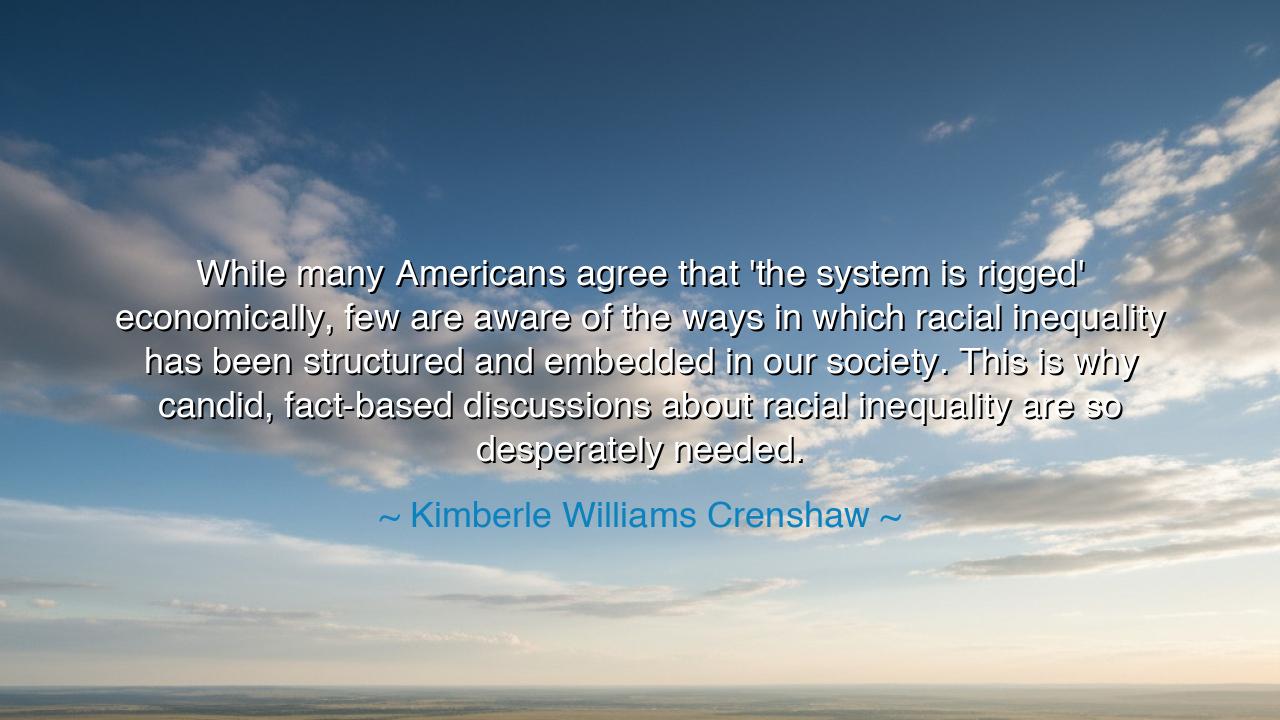
While many Americans agree that 'the system is rigged'
While many Americans agree that 'the system is rigged' economically, few are aware of the ways in which racial inequality has been structured and embedded in our society. This is why candid, fact-based discussions about racial inequality are so desperately needed.






Hear the solemn and piercing words of Kimberlé Williams Crenshaw: “While many Americans agree that 'the system is rigged' economically, few are aware of the ways in which racial inequality has been structured and embedded in our society. This is why candid, fact-based discussions about racial inequality are so desperately needed.” These words are a torch, illuminating the hidden architecture of injustice. They tell us that oppression does not live only in single acts of hatred or prejudice, but is woven into the very structures of society, hidden in laws, traditions, and unspoken assumptions. And they call us, with urgency, to name these truths openly, for silence allows injustice to thrive in the shadows.
The origin of this thought lies in Crenshaw’s long labor as a scholar and advocate. Known for coining the concept of intersectionality, she revealed how systems of oppression overlap, compounding the burdens of those who are marginalized by both race and gender. From this vantage, she saw how many Americans could acknowledge economic inequality, yet remain blind to how racial inequality was not merely a byproduct of poverty, but a deliberate structure, embedded in housing, education, employment, and the justice system. Her words are a summons to courage: to confront uncomfortable truths, and to admit that inequality is not an accident but a design.
The ancients too warned of unseen chains. Recall Plato’s allegory of the cave, where prisoners mistake shadows for reality because they cannot see the fire that casts them. Just so, many people today see only the surface of inequality, imagining it to be occasional or individual. Crenshaw’s teaching pulls us out of the cave, forcing us to face the structures that cast these shadows—the laws and practices that perpetuate disadvantage, generation after generation. To deny these truths is to remain chained; to see them clearly is the beginning of freedom.
History bears witness to these hidden designs. Consider the redlining policies of the 20th century United States, when banks and governments systematically denied Black families access to housing loans in certain neighborhoods. This was not personal prejudice alone—it was written into maps, laws, and institutions. Generations were denied wealth, security, and opportunity, while others were enriched. And the effects endure even today, in the racial wealth gap and segregated communities. Here we see the truth of Crenshaw’s warning: inequality is not random, but structured and embedded.
The meaning of this quote is therefore both heavy and hopeful. It tells us that the sickness of racism is not cured by goodwill alone; it must be rooted out from the soil of our institutions. But it also teaches that this work is possible, if we are brave enough to engage in candid, fact-based discussions. Without truth, reconciliation cannot come. Without knowledge, reform cannot succeed. The conversation is not a luxury—it is a necessity, for silence is the ally of oppression.
What lesson, then, shall we take? That we must listen to the stories of those who bear the weight of inequality. That we must study history, not to dwell in guilt, but to understand the chains that still bind us. That we must teach our children truth, not myths that conceal injustice. And above all, that we must not flinch from fact-based discussions, even when they stir discomfort, for in discomfort lies the beginning of transformation.
Therefore, children of the future, inscribe this wisdom upon your hearts: to heal society, you must first see its wounds. Do not be lulled by half-truths that speak only of economic unfairness while ignoring racial injustice. Look deeper, ask harder questions, and bring truth into the light. For only by naming injustice can you dismantle it; only by speaking truth can you build a world where equality is not a shadow but a living reality. And in this work, the words of Crenshaw shall remain as a beacon, guiding you toward a society rooted in justice, dignity, and truth.






AAdministratorAdministrator
Welcome, honored guests. Please leave a comment, we will respond soon